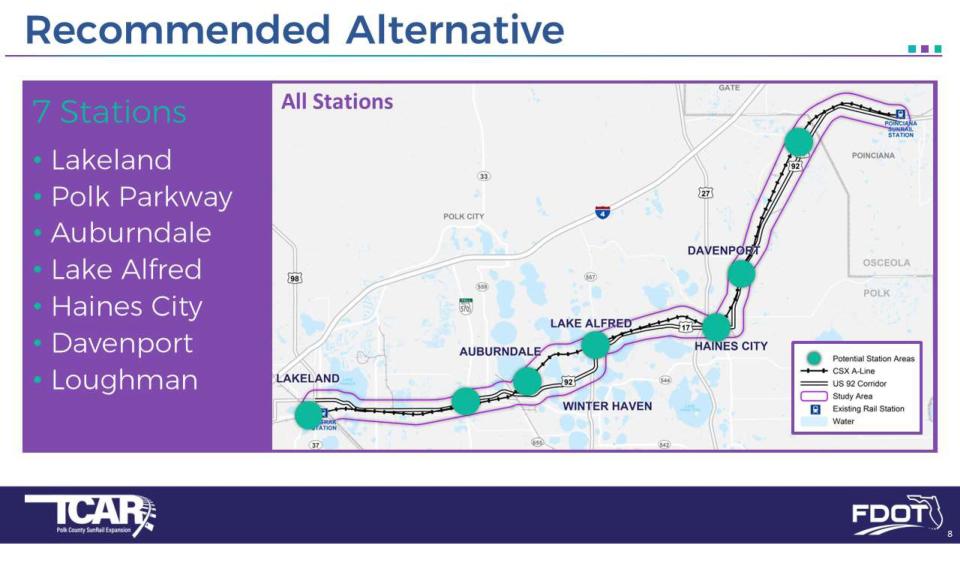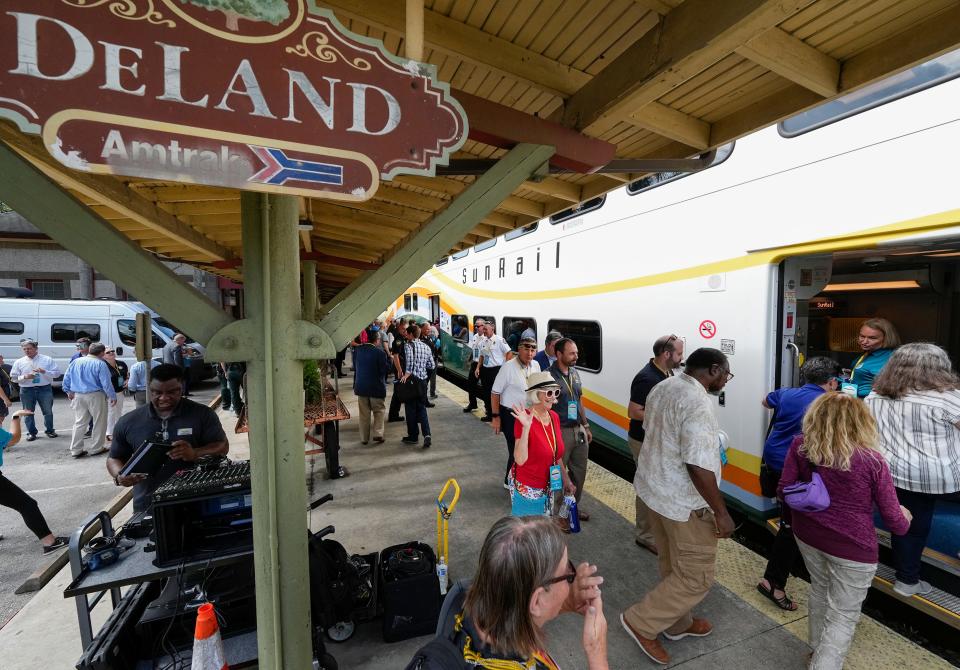First phase of SunRail extension into Polk County would end at Haines City
After years of speculation, the Florida Department of Transportation has revealed the first map showing potential stops for the SunRail train service in Polk County.
The state agency is recommending seven stations in Polk County, ranging from Loughman to Lakeland. The first phase of the extension would run from an existing station in the Poinciana area to Haines City, with stops in Loughman and Davenport.
A consultant shared the details in a presentation to the Polk Transportation Planning Organization last month. The TPO board voted to accept the study results and asked the state agency to further evaluate the concept by proceeding with the next phase, a project design and environmental study.

The TPO includes all five Polk County commissioners, most of the Lakeland City Commission and elected officials from other cities in the county.
SunRail is a commuter rail service that covers 49 miles, with 16 stations in Volusia, Seminole, Orange and Osceola counties. Its trains, powered by hybrid, diesel-electric engines, offer service on weekdays.
In a slide presentation at the Oct. 12 meeting, Scott Pringle, the consultant project manager for the study, provided an overview of the Transit Concept and Alternatives Review, part of the study’s planning phase, the first of five phases in the project development process. The study sought to determine the feasibility and benefits of extending commuter rail service into Polk County.

The study area covered northeast Polk County and extended down to the Lakeland area. It recommended rail stations at Loughman, Davenport, Haines City, Lake Alfred, Auburndale, the Polk Parkway and Lakeland, with tracks covering 37 miles. The first segment, ending at Haines City, would add 16 miles to the existing rail line.
FDOT established seven preliminary alternative routes and narrowed that list to four before choosing the recommended alternative. The agency considered such factors as funding opportunities and feasibility to construct.
Maps place the proposed routes along existing train tracks running near U.S. 17/92 west to Lake Alfred and then near U.S. 92 to Lakeland.
Removing cars from roads?
The study included projected ridership figures for 2035 at the seven potential stations. It predicted that about 70% of boardings would occur at the three northernmost locations, with nearly 50,000 at Haines City. The study foresaw about 17,000 boardings in Lakeland.
The report estimated the cost for the first phase of expansion at $23 million per mile, calculated in 2023 dollars. That cost includes construction of additional track and upgrades of existing track.
FDOT estimated the annual cost to operate and maintain the route at $12 million. That cost incorporates structures, stations, trains, facilities and systems costs.
As part of the study, FDOT polled residents in a MetroQuest preference survey and a virtual workshop. The MetroQuest survey, with 4,858 participants, found that 98% favored extending SunRail into Polk, FDOT reported.
The extension’s first phase would reduce annual vehicle travel in the area by 14 million miles, the report said, equivalent to eliminating about 791,000 commuter vehicle trips from local roads. That amounts to a reduction in greenhouse gas emissions of 7,550 tons, the report said.
Haines City Commissioner Roy Tyler, a member of the TPO board, described the proposed extension to his city as “logical” and said the new spur would provide a “gateway” for Polk County residents to travel by SunRail.
Tyler said he senses support for the expansion among Haines City residents.
“My hometown team is fully on board because they would be kind of immediate benefactors from it — not just Haines City, but East Polk County,” Tyler said. “Serving on a number of boards that were not necessarily contained to my service at Haines City’s Commission, I started to learn that there's a bigger world than just the one I’m in. And if I don't realize that, my citizens travel to Orlando, they travel to Tampa. People in Orlando, people in Tampa come through Polk, for that matter. And so it's a holistic kind of a problem.”
Tyler, who has served on the Haines City Commission for more than 30 years, described the drastic increase in traffic on local roads, such as U.S. 27, over the decades.
“When I hear people say, ‘We need more roads,’ I don't discount that,” he said. “But because of where I've spent the last 10 or 15 years on both these panels, I understand that simply paving another road or expanding one is not going to reach nirvana. It’s not going to happen. As we continue to grow, you're just not going to be able to pave your way out of that challenge.”
Other members of the TPO board expressed skepticism about the expansion into Polk, mainly focusing on the cost of operating the rail service. Polk County Commissioner Neil Combee appeared to be the only TPO board member who opposed proceeding with the project design and environment study in a voice vote at the Oct. 12 meeting.
Noting that the current service costs about $42 per ride but collects only about $6 from each passenger, Combee said, “That doesn’t seem like a really great deal for taxpayers.”
Combee also expressed concern that the rail service could inhibit the rise of industry and jobs based in Polk County by making it easier for local residents to commute to jobs elsewhere.
Two major I-4 projects in Polk now scheduled to start earlier, Florida DOT says
“If SunRail advances Polk County as bedroom community for Orlando, Tampa or any place else, then I am opposed to it,” Combee said. “We need business. We need industry. We don’t need to be a bedroom community for Orlando.”
Polk County Commissioner George Lindsey voiced some skepticism about the study. Citing the small number of participants in the FDOT survey, he said that board members should not put too much emphasis on the results.
How to pay for it?
Lindsey also raised questions about who would pay to operate the service after the extension is built. Pringle said the existing lines are run by the Central Florida Commuter Rail Commission, whose governing board includes elected officials from Orange, Osceola, Seminole and Volusia counties. He said opportunities exist for state and federal grant money to help offset the operational costs.
During the meeting and in a subsequent interview, Lindsey emphasized that fares from riders never come close to covering the costs of operating a mass-transit service.
“So that begs the question, ‘Where's the rest of the money coming from, even if the state pays for the initial installation?’ ” he said.
Lindsey said that he doesn’t think a public-private partnership is viable because so many jurisdictions would need to be involved. He said the SunRail expansion would probably require the creation of a municipal service taxing unit, similar to the one that generates funding for Citrus Connection, Polk County’s mass transit service.
“And I think that would be a very, very tall hill to climb, which, I guess, would take the next four, five, six years or something for somebody to finally come up with a conclusion as to, ‘OK, here's the course of action, and here's the game plan, and this is how we pay for it,’ ” Lindsey said. “My guess is the incremental studies along the way will begin to paint a picture that may not be financially feasible.”
Tyler said that Polk County faces steep costs for addressing traffic congestion, no matter what approach it takes.
“And as to who's paying for it — well, again, we're paying for it now,” Tyler said. “And if we're going to start trying to add more roads to cover what this problem is, we're going to pay for it way, way more than we would be paying to extend SunRail.”
Lakeland City Commissioner Sara Roberts McCarley, also a TPO board member, acknowledged the cost but said rail service could produce economic and educational boosts for residents.
“This is a much bigger macrocosm, not a microcosm, that can really be influential in our future growth and also help us with that future growth to pull more cars off the highway, and that’s a safety issue as well,” McCarley said. “So, as much as I do caution (about) the expenditure this goes into and the longtime marriage that we would have to have in providing this service, and it could be very, very expensive, we also have to look at ripple effect down the road of how it could counterbalance through economic development and educational development for the people in Polk County.”
Gary White can be reached at gary.white@theledger.com or 863-802-7518. Follow on X @garywhite13.
This article originally appeared on The Ledger: FDOT recommends first phase of SunRail extension into Polk County

